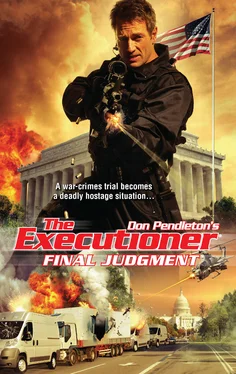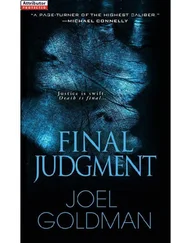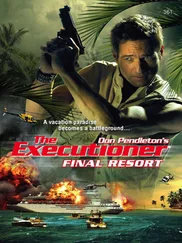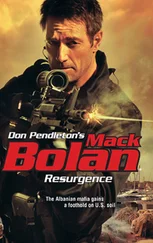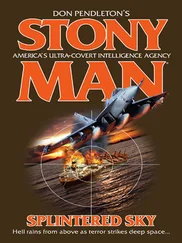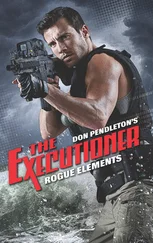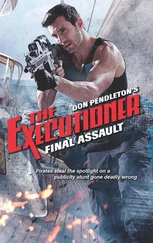Shoving the hatch open with his shoulder, Bolan risked a look.
Bullets tore into the roof to either side of him. He let himself fall, crashing heavily to the floor below, slowing his descent only by gripping the ladder’s uprights with his knees as he slid down. Catching his shoulder at an imperfect angle, he cracked his head and swore as his teeth rattled.
The gunners above ripped the hatch up and chased him with automatic fire from their micro-Uzis. The opening hatch admitted a small tornado of wind churned up by the cargo helicopter. The neo-Nazis were visible briefly in silhouette against the sky. There were no hostages nearby.
Rolling to dodge the bullets, Bolan yanked a grenade from his web gear, jerked out the pin and counted. The neo-Nazis were just moving to close the access hatch when, as if thrusting a shot put in the Olympics, the Executioner heaved his grenade through the opening. He continued his roll as the explosion rattled the metal hatch in its frame, buckling it. Plaster dust and fragments of concrete pelted his arms while he covered his head from the debris.
“Jack,” said Bolan, his ears ringing. “G-Force, come in.”
There was no response.
He reached up and touched his ear. The earbud transceiver was gone. It had to have been dislodged during his fall. If Grimaldi was still speaking to him, Bolan’s hearing was too far gone at the moment to perceive it.
The only option was the ladder, then the roof. Grimaldi would have to look after things in the air as best he could; there was no way for the soldier to ask for help or suggest options.
The noise of the chopper above was changing pitch, growing more powerful. The craft was lifting off.
Bolan hit the ladder, pausing when the steel structure creaked and groaned, obviously loosened in its mounts by the explosion. The soldier kept going, again putting his shoulder against the hatch, this time straining with all his might against the bent, hot metal. He finally succeeded in dislodging the cover, and pushed through, hitting the roof of the courthouse amid the gritty windstorm that was the big helicopter’s rotor wash.
The chopper was hovering three feet off the roof, its doors open. When the neo-Nazis saw Bolan and, more importantly, his modified M-4 carbine, they opened up on him from the chopper with their Kalashnikovs. The soldier took cover behind the only object close enough and strong enough to save him: a large external air-conditioning unit squatting on the rooftop.
The frame of the air conditioner rattled and banged as the 7.62 mm rounds started to smash it apart. Bolan arranged himself to present as compact a target as he could. Then he pressed up with one leg, waited for a lull in the gunfire, and popped up, triggering a blast from his carbine.
He targeted the chopper’s rotor. The pilot recognized the threat immediately and began to veer away. It was unlikely Bolan could bring the bird down that way—nor was he putting the hostages in any danger—but if he damaged the rotor sufficiently, any sane pilot would put the aircraft down. There was an equal chance the helicopter would simply fly away to escape the danger. Either way, the hostages would be out of the direct vicinity of the firefight, if only because the neo-Nazis had left their opponent behind.
Where was Grimaldi?
Bolan popped up again and unleashed another blast. The chopper moved farther from the roof, nearing the edge.
Three men jumped out.
The camouflage-clad neo-Nazis ran straight for Bolan’s position, firing their weapons. The soldier was impressed; it was the play they were least likely to make, requiring the most guts. He let them blaze away. They were well-trained for their kind, but not compared to him. They didn’t stagger their fire, and ran dry on top of one another, scrambling to change magazines. With no choice but to fight or die, they rushed Bolan, perhaps thinking to bludgeon him with the heavy wooden stocks of their assault rifles.
Behind them, the chopper lifted clear and kept going.
Bolan rounded the chewed-up air conditioner and emptied the magazine of his carbine into the first man. He let the weapon fall to the end of its sling, drawing his Beretta 93-R and Desert Eagle in one smooth motion. The men were coming straight for him as his pistols came up, tracking them both.
The Executioner could hit whatever he could see, but he was human.
There simply wasn’t time to shoot the men before they collided with him. Bolan hit the roof on his back, tucking his head this time, clenching his jaw against the pain as the neo-Nazis bore him down and crushed him. The shotgun blast to the abdomen made itself known again, as his stomach screamed in pain under the pressure of his two foes.
Bolan slammed the Desert Eagle into the side of the closest man’s head and pulled the trigger, punching a round into the roof of the courthouse. The thunder of the pistol against the neo-Nazi’s skull burst his eardrum. Screaming, bleeding from the ear, he clapped his hand to the wound, losing his grip on Bolan.
The soldier wrenched his Beretta back on target from beneath the second enemy. He slammed the butt of the Desert Eagle into the man’s face and pulled the Beretta’s trigger a heartbeat after. His opponent jerked, his eyes rolled up and he collapsed, now nothing but deadweight.
Bolan’s hearing was, despite the firefight, returning to normal. The sound of sirens was becoming louder. There were many of them.
Standing, the Executioner stepped in and threw a savage kick into the ribs of the writhing, half-deafened neo-Nazi, who was struggling to draw a pistol from a holster on his hip. The kick caused the terrorist to double up. Bolan bent and, realizing he had nothing with which to secure the man’s hands, rolled him over and grabbed him by the collar. He dragged the bleeding, stunned man behind him toward the open hatch and threw him in. The terrorist landed with a crunch as Bolan followed, sliding down the ladder before it came completely free from its frame. Loose now, it rattled within the widened metal collar framing the hatchway.
“Sarge!” a tinny voice was saying from somewhere in the anteroom. “Sarge! Come in!”
Bolan looked toward the neo-Nazi, who was curled in a ball on the floor, and then scanned the space. He spotted his transceiver and snatched it up, replacing it in his ear.
“Sarge!” Grimaldi called once more. “I’ve lost the chopper, repeat, I have lost the chopper!”
“Striker to G-Force,” Bolan said. “Report.”
“Sarge, the MPD shielded the helicopter with their own units. They dared me to shoot them down, knowing I wouldn’t. Barb and Hal are burning up the airwaves with the powers that be in D.C., but they’re stonewalling us. I repeat, they’re stonewalling us.”
Bolan grunted. “No small feat.”
“No, it isn’t, Sarge,” Grimaldi said. “There’s more bad news.”
“Go ahead.”
“Your position is about to be overrun. Police, fire, first response medical… It’s a zoo out there now that Nitzche and his men have pulled out.”
“Understood,” Bolan said. He began rummaging through the shredded remains of his canvas bag, sorting out the undamaged equipment and munitions from the rest. He found several of his plastic zip-tie cuffs and used these to secure the deafened terrorist’s wrists and ankles.
In the little time he had left, the soldier redistributed everything he could from the ruined war bag to his web. Fortunately, most of his loaded magazines had survived the assault. A few pieces of electronic and countermeasures gear were destroyed. Finally, he found the item that had saved his life: a slim netbook computer, sheathed in a Kevlar skin designed by John “Cowboy” Kissinger. The tiny computer was wrecked, bent into a V-shape from the fist-size punch of heavy shot at close range. It was the point of that V that had bruised Bolan’s gut, as brutal as any spear-hand blow to naked flesh.
Читать дальше
